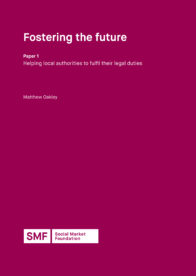This report is the first of two papers looking at how to improve the system of foster care in England. It explores current and future challenges surrounding the provision of appropriate foster care placements that meet the needs of some of society's most vulnerable children.
Key points
- It is not the overall number of available placements within the foster care system that matters. It is the appropriateness of these places and whether they meet the needs of children coming into the system.
- Pressure on the system is rising, with increasing numbers of children and young people needing foster care each year. Based on the growth seen in the last five years, we could expect that close to 77,000 children will be in foster care by 2030; an increase of more than 30% from now. Over the last five years, growth in the number of approved foster care families was significantly lower than the required level (2.9%).
- Freedom of Information requests sent out to all 151 local authority fostering agencies point to a systematic lack of strategic planning with regards to meeting the needs of what is an easily identifiable group of children entering the fostering system. Only 9 local authorities (6%) provided detail on the numbers of sibling groups that they expected to need to provide placements for in future years.
Recommendations
- A nationally coordinated assessment of effective capacity – the Department for Education should lead a review, working with Ofsted, local authorities and IFPs to compile as much information as is known about current and projected future need.
- A national strategy for increasing effective capacity – the national assessment should be used to develop a national strategy for defining, measuring and delivering effective capacity, which can support local strategies.
- Provide local authorities with more support to meet their duties and improve accountability – central government should provide updated guidance around councils’ sufficiency duty, publish more data on needs and sufficiency, and a resource for local authority planning.
- A national register for foster carers – a national register, alongside defined training standards, and effective data collection could be used to improve recruitment and support local authorities to improve matching.
- Adopting regional commissioning – regional bodies that plan and commission strategically could shape and manage the market, with scope to lower prices through collective bargaining power, block contracting (buying a set number of places rather than just agreeing prices) and realising economies of scale.

Download The Report: PDF
Kindly sponsored by

